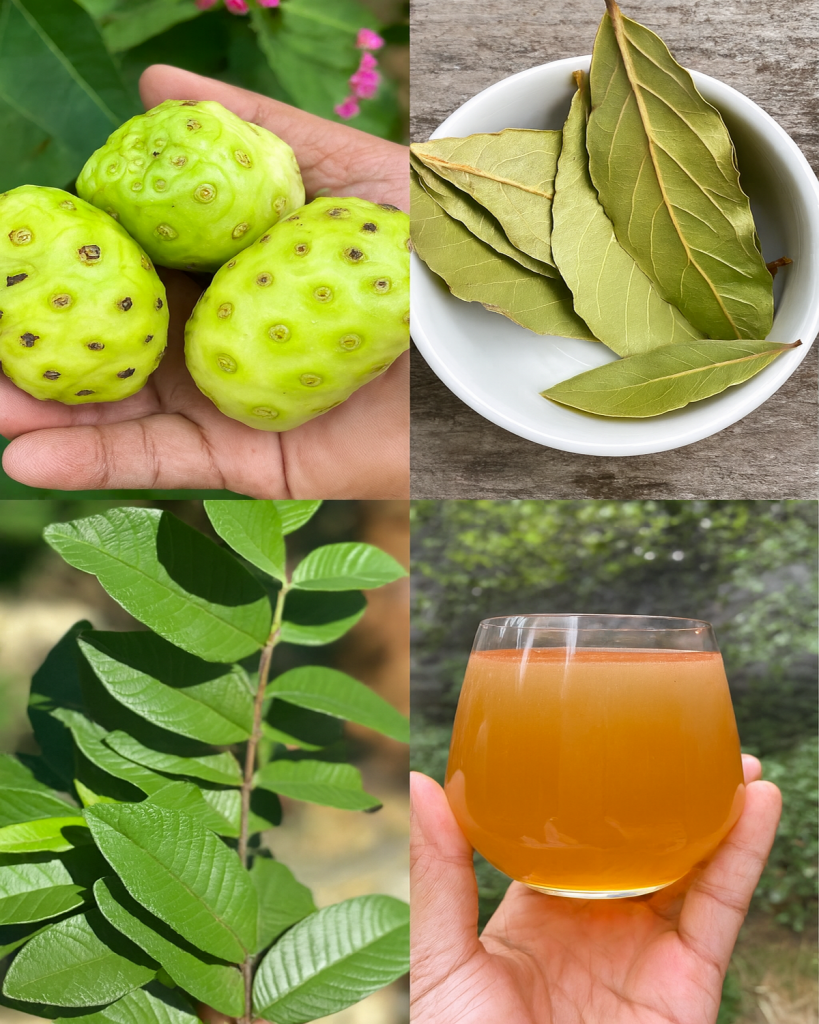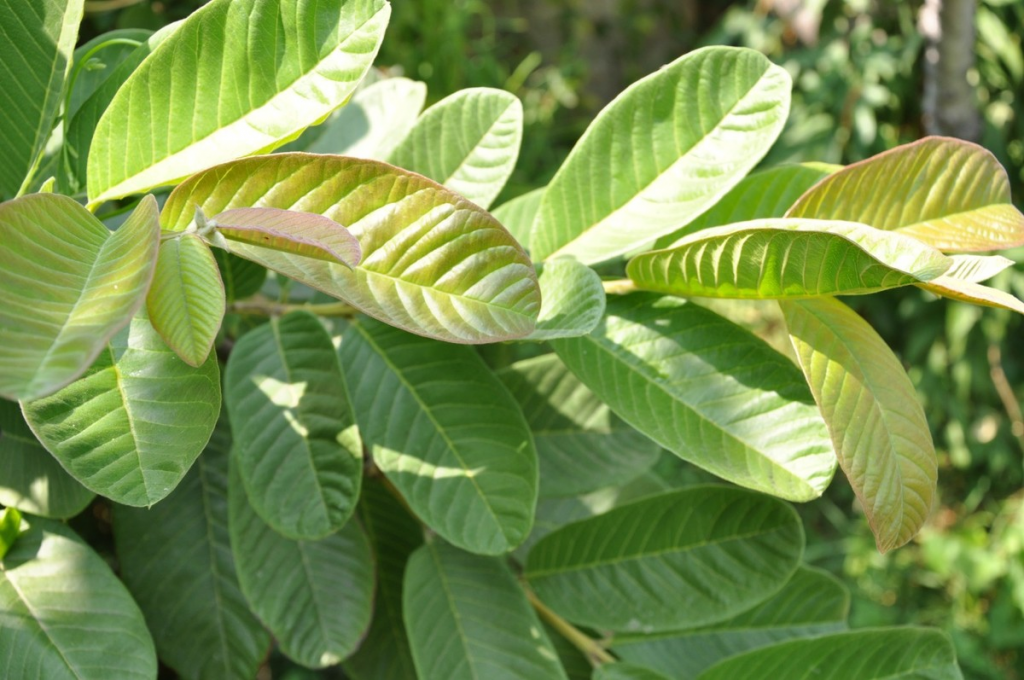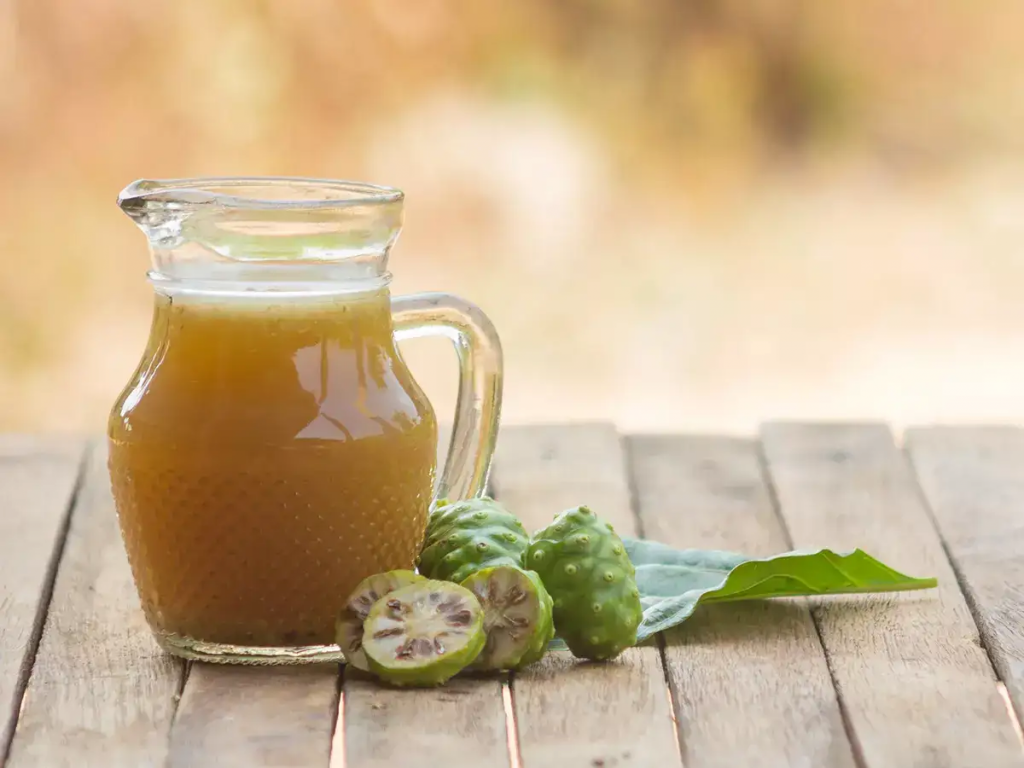What if the solution to multiple chronic health concerns—diabetes, poor circulation, swelling, even abnormal cell growth—was not locked away in a pharmacy, but hidden in your kitchen? Around the world, millions struggle with these conditions every day. In fact, the World Health Organization reports that chronic diseases account for over 70% of global deaths annually. For many, expensive medications are the first line of defense, but history and modern science alike suggest that nature also provides powerful support.
Enter a blend that has been quietly praised across cultures: noni fruit, bay leaves, and guava leaves. Used for centuries in traditional medicine, these three natural ingredients each bring unique compounds that help the body fight inflammation, regulate blood sugar, improve circulation, and strengthen immune defenses. What happens when you combine them into one powerful blend? That’s the question more and more people are beginning to ask—and the answers are surprising.

Why This Blend Stands Out
Unlike single remedies that target one concern, the noni–bay leaf–guava leaf trio works on multiple systems at once:
- Noni fruit: Known for its rich antioxidants, anti-inflammatory properties, and potential support against abnormal cell growth.
- Bay leaves: Traditionally used for digestion and circulation; modern studies suggest they may help lower blood sugar and cholesterol.
- Guava leaves: Packed with polyphenols and flavonoids shown to regulate glucose levels and promote heart health.
Together, they form a holistic approach—supporting metabolic balance, immune strength, and cardiovascular wellness in one simple formula.
1. Noni: Nature’s Controversial Superfruit
Noni (Morinda citrifolia) has been used for centuries across Polynesia and Southeast Asia. Modern research suggests it contains antioxidants like scopoletin and quercetin, which may help combat oxidative stress. Noni juice has also been studied for its potential to modulate immune response and reduce inflammation.

Real-life example: In rural communities in Hawaii, elders often consumed small amounts of fermented noni juice daily, believing it kept their energy and immunity strong well into their later years.
Tip for use: Noni has a strong taste, so blending it with herbal infusions like guava or bay leaf tea can make it more palatable.
2. Bay Leaves: More Than a Cooking Spice
Bay leaves are often thought of only as flavor enhancers, but they have a history in traditional healing. Research indicates compounds in bay leaves may:
- Improve insulin function
- Lower cholesterol and triglyceride levels
- Promote better blood flow
Practical use: A simple bay leaf tea, steeped for 10 minutes, can be consumed once or twice daily to support circulation and digestion.
Everyday story: Maria, a 55-year-old with borderline diabetes, began adding bay leaf tea to her morning routine. Within months, her post-meal blood sugar spikes became more manageable, alongside her doctor-approved lifestyle changes.
3. Guava Leaves: An Unsung Hero for Blood Sugar
Guava leaves may be the most overlooked part of this blend. Rich in antioxidants and flavonoids, they are often used in Asia as a natural aid for blood sugar balance. Studies suggest guava leaf extract can reduce blood sugar spikes after meals and may even improve overall cholesterol profiles.

DIY practice: Boil a handful of guava leaves in water for 10 minutes, strain, and sip warm. The taste is mild, earthy, and blends well with noni and bay leaf.
Health angle: By lowering oxidative stress and supporting metabolic health, guava leaves also contribute to reducing the risk factors linked to swelling and poor circulation.
4. The Synergy of the Blend
When combined, noni, bay leaves, and guava leaves offer more than their individual benefits. The synergy lies in how they support overlapping systems:
| Ingredient | Primary Benefit | Secondary Benefit |
|---|---|---|
| Noni | Anti-inflammatory, antioxidant | Supports immune health |
| Bay Leaves | Blood sugar balance, circulation | Improves digestion |
| Guava Leaves | Blood sugar regulation | Heart and vascular support |
This creates a blend that:
- Supports healthy blood sugar levels (bay + guava)
- Improves circulation and reduces swelling (bay + noni)
- Strengthens natural defenses against oxidative stress (noni + guava)
5. How to Make the Blend at Home
Here’s a simple way to prepare this health-supporting combination:
Ingredients:
- 1 small piece of ripe noni fruit or 2 tbsp noni juice
- 2–3 dried bay leaves
- A handful of fresh or dried guava leaves
- 3 cups of water
Instructions:
- Boil the bay and guava leaves in water for 15 minutes.
- Remove from heat and add noni juice (or mash fresh noni and strain into the liquid).
- Let cool slightly before drinking.
- Optional: Add a teaspoon of honey or a squeeze of lemon for taste.
Drink 1 cup daily, ideally before meals, as part of a healthy lifestyle.

6. Safety and Precautions
While natural, these ingredients still require mindfulness:
- Noni may interact with certain medications, especially those affecting the liver or potassium levels.
- Bay leaves should not be consumed whole (they are sharp and hard to digest). Stick to teas or powdered forms.
- Guava leaves are generally safe, but excessive intake may cause mild constipation.
Always consult your healthcare provider before introducing new remedies, particularly if you’re managing chronic conditions or taking prescription medications.
Conclusion: Nature’s Trio With Modern Potential
The blend of noni, bay leaves, and guava leaves is not a miracle cure—but it is a time-tested, nutrient-rich option that supports blood sugar balance, circulation, inflammation control, and cellular health. By combining traditional wisdom with modern science, this blend represents how simple, everyday ingredients can play a role in long-term wellness.
FAQ Snapshot
- Can this replace my prescription medication? No. It can complement your care, but your doctor’s advice should always come first.
- How soon can I notice effects? Many report subtle benefits after several weeks, but consistency matters most.
- Is it safe for everyone? Generally safe in moderate amounts, but always check with your healthcare provider.
*Disclaimer: This article is for educational purposes only and does not replace medical advice. Always consult your healthcare professional before making significant changes to your diet or lifestyle.




